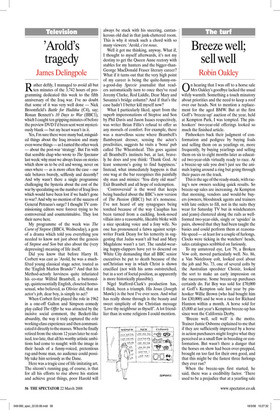’Arold’s tragedy
James Delingpole
Rather deftly, I managed to avoid all but ten minutes of the 3,742 hours of programming dedicated this week to the fifth anniversary of the Iraq war. I’ve no doubt that some of it was very well done — Nick Broomfield’s Battle for Haditha (C4), say; Ronan Bennett’s 10 Days to War (BBC1), which I caught ten gripping minutes of before the preview DVD I’d been sent went mysteriously blank — but my heart wasn’t in it.
Yes, I’m sure there were many bad, misguided things about the Iraq invasion and many even worse things — as I ranted the other week — about the post-war ‘strategy’. But I’m with that sensible chap who wrote to The Spectator last week: why must we always focus on stories which show us to be evil and wrong, never on ones where — as is more often the case – our side behaves bravely, selflessly and decently? And why wasn’t there a single programme challenging the hysteria about the cost of the war by speculating on the number of Iraqi lives which would have been lost if we hadn’t gone to war? And why no mention of the success of General Petraeus’s surge? I thought TV commissioning editors were forever trying to be controversial and counterintuitive. They lost their nerve here.
My programme of the week was The Curse of Steptoe (BBC4, Wednesday), a gem of a drama which told you everything you needed to know not just about the genesis of Steptoe and Son but also about the (very depressing) meaning of life itself.
Did you know that before Harry H. Corbett was cast as ’Arold, he was a muchfêted young classical stage actor, touted as the ‘English Marlon Brando’? And that his Method-actorly luvviness quite infuriated his co-star Wilfrid Brambell, a buttonedup, quintessentially English, closeted homosexual, who believed, as Olivier did, that an actor’s job, dear boy, is simply to act?
When Corbett first played the role in 1962 in a one-off Galton and Simpson comedy play called The Offer he was attracted by the incisive social comment, the Beckett-like absurdity, the way it truly captured the echt working-class experience and then communicated it directly to the masses. When he finally retired from the sitcom 12 years later he realised, too late, that all his worthy artistic ambitions had come to naught: with the image in their heads of a funny-voiced, pretentious rag-and-bone man, no audience could possibly take him seriously as the Dane.
Here was a tragic case of life imitating art. The sitcom’s running gag, of course, is that for all his efforts to rise above his station and achieve great things, poor Harold will always be stuck with his sneering, cantankerous old dad in that junk-cluttered room. This is why it struck such a chord with so many viewers: ’Arold, c’est nous.
Well it got me thinking, anyway. What if, I thought to myself afterwards, it’s not my destiny to get the Queen Anne rectory with stables for my hunters and the bigger-thanGeorge MacDonald Fraser literary career? What if it turns out that the very high point of my career is being the quite-funny-ona-good-day Speccie journalist that readers automatically turn to once they’ve read Jeremy Clarke, Rod Liddle, Dear Mary and Susanna’s bridge column? And if that’s the case hadn’t I better kill myself now?
What I particularly liked, apart from the superb impersonations of Steptoe and Son by Phil Davis and Jason Isaacs respectively, was writer Brian Fillis’s refusal to offer us any morsels of comfort. For example, there was a marvellous scene where Brambell’s flamboyant dresser, sensing the actor’s proclivities, suggests he visits a ‘bona’ pub called The Wheatsheaf. This goes against all Brambell’s instincts but, at last, bravely he does and you think: ‘Thank God. At least someone’s going to find happiness.’ Instead, what immediately happens is that one wag at the bar recognises this painfully shy man and mimics: ‘You dirty old man!’ Exit Brambell and all hope of redemption.
‘Controversial’ is the word that keeps being bandied about the BBC’s new version of The Passion (BBC1) but it’s nonsense. I’ve not heard of any synagogues being torched because of the way Caiaphas has been turned from a cackling, hook-nosed villain into a reasonable, likeable bloke with a nice speaking voice and a foxy wife. No one has pronounced a fatwa against scriptwriter Frank Deasy for his temerity in suggesting that Judas wasn’t all bad and Mary Magdalene wasn’t a tart. The sandal-wearing happy-clappers have yet to descend on White City demanding that all BBC senior executives be put to death because of the unChristian way in which Christ is shown crucified (not with his arms outstretched, but in a sort of foetal position, as apparently is more historically plausible).
Nigel Stafford-Clark’s production has, I think, been a triumph. His Jesus (Joseph Mawle) is the best I’ve ever seen. And what has really shone through is the beauty and sweet simplicity of the Christian message ‘Love thy neighbour as thyself’. A lot friendlier than in some religions I could mention.


















































































 Previous page
Previous page